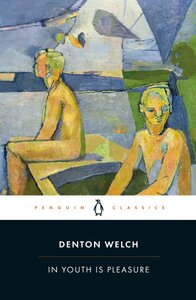Born into a mercantile family, Denton Welch (1915-48) fractured his spine in a cycling accident at the age of 20, which would shape the rest of his life. He began writing in the 1940s; the autobiographical In Youth Is Pleasure (1945) was his second novel, and has recently been published in Penguin Classics.
The novel tells of one summer in the life of 15-year-old Orvil Pym, a boy who doesn’t fit in either at school or with his family. Orvil is distant from his father and brothers: he was closer to his mother, but she died three years ago, and Orvil is forbidden from even mentioning her. “She was never to be thought of or considered again – because she had been loved so much.”
Most of In Youth Is Pleasure is set at a hotel in Surrey, where Orvil is spending the holidays with his father and brothers. This isn’t so much a novel of events: it’s about Orvil exploring his way of experiencing the world and his sense of self. Welch’s writing is often vivid. For example, here Orvil is reading an Edwardian exercise manual while eating in the busy hotel court:
The chatter and the music surged around him. The waves of the sound broke through the deliciousness of the cakes, then receded and were forgotten again. Orvil was not concentrating, but the hyphenated words ‘press-up’, ‘knees-bend’, ‘trunk-turn’, ‘deep-breathing’, jumped out from the printed page. His eyes also idly followed the diagrams of a coarse little man who squatted, thrust his legs out, and tucked his chin into his neck until a large vein, like a branching ivy stem, stood out on his forehead.
The first part of this paragraph conveys the mix of sensations that Orvil experiences. In the rest, there’s a sense of him being confronted by physicality and beginning to process his feelings. This is how Welch’s novel proceeds, with Orvil working himself out as he goes along. We’re right there with him, in an experience that lives long beyond the final page.

Recent Comments